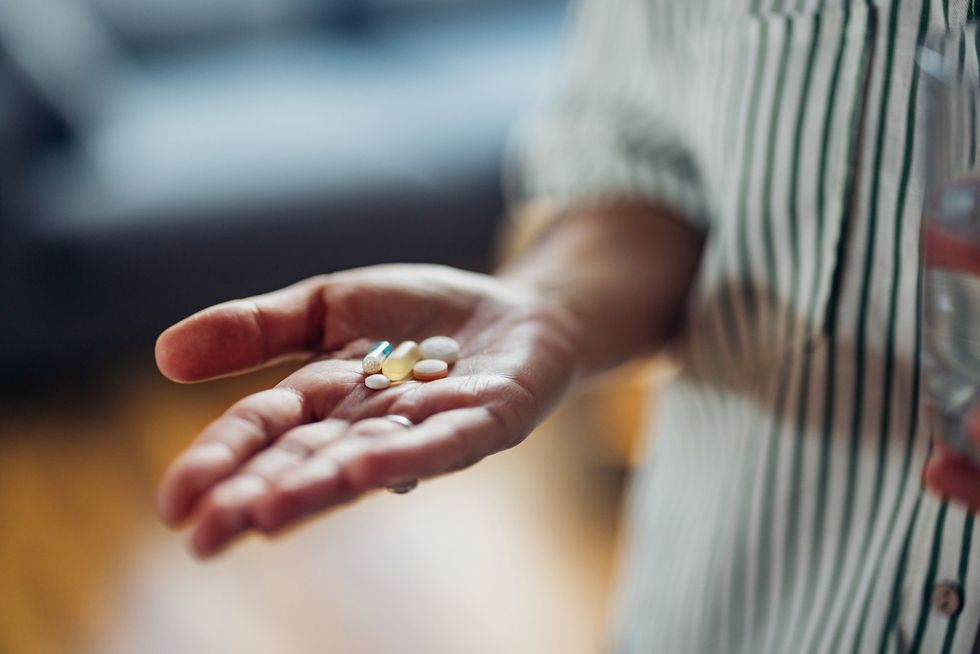At the surface, supplements claim to be able to provide all kinds of health and wellness benefits—including helping you age in reverse. While plenty of pills and powders are touted as “anti-aging” in the market today, few have seen such fast virality as NAD+ (nicotinamide adenine dinucleotide). Hailed by celebrities like Jennifer Aniston as “the future” of wellness regimens, NAD+ has received plenty of hype as a supplement for its purported anti-aging properties that help ward off age-related health issues and giving skin a youthful look. However, experts are questioning: is it actually effective?
Thanks to a new study, scientists have new evidence and are warning that NAD+ might be more of a waste of money than an anti-aging miracle. In fact, they found that a decrease in NAD+ in mice did not lead to any decreased physical activity or increased health problems, suggesting that the glowing benefits many claim NAD+ can provide should be reconsidered. Here’s exactly what the research found and what you should know about taking—or purchasing—NAD+ supplements.
RELATED: 104-Year-Old Woman Reveals Her Anti-Aging Skincare Routine
What is NAD+?
It’s quickly becoming a household name, but as with many supplements, NAD+ is a molecule that’s found naturally within the cells in your body.
“It is vital for activating enzymes called sirtuins and PARPs—classes of enzymes involved in DNA repair, longevity, and inflammation,” Daniel Puleston, PhD, an assistant professor of oncological sciences at the Icahn School of Medicine at Mount Sinai in New York, told The New York Post. “For these reasons, NAD plays a fundamental role in humans and all other living organisms.”
While our bodies produce plenty of it while we’re young, levels begin to dip as we age. The lack of the coenzyme can make it harder to heal and may eventually lead to other health problems. This has led some to assume that supplements can help bolster dwindling levels and provide a boost of youth in the form of a pill, injection, or IV drip.
Some celebs have flocked to NAD+ for its purported ability to provide a healthier, youthful appearance to skin by reducing wrinkles and dark spots. It’s also claimed to help take on diabetes, chronic inflammation, and serious health conditions like heart disease.
So far, the public seems to be literally buying into the hype, with the NAD+ market valued at $184 million in 2022.
New Study Pokes Holes in NAD+ Supplements’ Efficacy
“Miracle” Anti-Aging Supplement Hyped By Celebs Is a Waste of Money, Scientists Warn
iStock
Even as lofty claims about its benefits continue to circulate, a new study published in the journal Cell Metabolism is casting some fresh doubts on NAD+’s purported effectiveness. To conduct their research, scientists engineered a type of mouse that could have its NAD+ levels in its skeletal muscle reduced by 85 percent below normal levels once it reached adulthood to mimic the decrease seen in aging humans.
The scientists noted that despite this decrease, the mice still exhibited normal levels of strength, muscle tone, exercise performance, and overall health. This carried over into an examination of health on the cellular level, where important gene and DNA markers also showed no signs of deterioration or advanced aging. The only notable difference spotted by the researchers involved slightly higher energetic stress during exercise and some metabolic differences, but otherwise remained as healthy as their normal mouse counterparts as they continued to age.
“Contrary to what might have been expected, healthy skeletal muscle function is not as reliant on high levels of NAD as previously thought. Importantly, our findings indicate that reducing muscle NAD levels well beyond the modest drops seen with normal aging does not cause muscle weakness or make the muscle age faster,” Sabina Chubanava, a PhD student who helped conduct the research, said in a press release.
Despite its essential function, scientists admit there is still little understanding about how declining NAD+ levels can affect the body. And rven though the essential molecule is being touted as something of a miracle, the study’s findings fly in the face of some of the loftier claims being made about it being a fountain of youth.
“Our results suggest that skeletal muscle can tolerate substantial NAD depletion without loss of function or accelerated aging,” Jonas Treebak, PhD, one of the study’s authors, said in a press release.
“This challenges the prevailing view that NAD+ decline is a primary driver of muscle aging and frailty,” he added.
RELATED: Dermatologists Share the Best Drugstore Skincare Products: “Anything More Is Not Necessary”
How to Get NAD+ Naturally
Even if you’re convinced that NAD+ is worth focusing on, you can still get your fix the old-fashioned way instead of paying a premium for supplements or treatments.
“While we don’t absorb NAD directly from food, our bodies can produce it from specific nutrients found in whole foods,” Serena Poon, a certified nutritionist, told Good Housekeeping.
To do this, she suggests getting plenty of precursors like nicotinamide mononucleotide (NMN) in foods like beetroot, cucumber peel, leafy greens, carrots, and scallions; or nicotinamide riboside (NR) found in chicory, bananas, oranges, avocados, leeks, cilantro, and purple taro.
You can also find them in Niacin (also known as vitamin B3) rich foods, which include mushrooms, sunflower seeds, peanut butter, brown rice, sweet potatoes, oats, quinoa, and green peas, as well as fish and poultry. Tryptophan is yet another important precursor, which you can find in pumpkin seeds, lentils, tofu, tempeh, chickpeas, almonds, and cashews.
Outside of diet, other lifestyle changes can help increase NAD+. This includes maintaining a fitness regimen, watching caloric intake, cutting excess fat and sugar from your diet, and even quick exposures to hot or cold such as a sauna or a cold plunge, Good Housekeeping reports.
Content shared from bestlifeonline.com.

